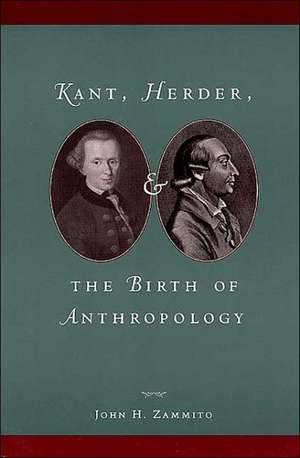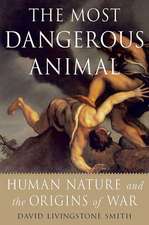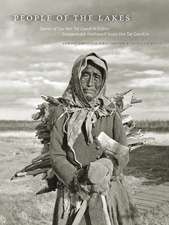Kant, Herder, and the Birth of Anthropology
Autor John Zammitoen Limba Engleză Paperback – 14 ian 2002
If Kant had never made the "critical turn" of 1773, would he be worth more than a paragraph in the history of philosophy? Most scholars think not. But in this pioneering book, John H. Zammito challenges that view by revealing a precritical Kant who was immensely more influential than the one philosophers think they know. Zammito also reveals Kant's former student and latter-day rival, Johann Herder, to be a much more philosophically interesting thinker than is usually assumed and, in many important respects, historically as influential as Kant.
Relying on previously unexamined sources, Zammito traces Kant's friendship with Herder as well as the personal tensions that destroyed their relationship. From this he shows how two very different philosophers emerged from the same beginnings and how, because of Herder's reformulation of Kant, anthropology was born out of philosophy.
Shedding light on an overlooked period of philosophical development, this book is a major contribution to the history of philosophy and the social sciences, and especially to the history of anthropology.
Relying on previously unexamined sources, Zammito traces Kant's friendship with Herder as well as the personal tensions that destroyed their relationship. From this he shows how two very different philosophers emerged from the same beginnings and how, because of Herder's reformulation of Kant, anthropology was born out of philosophy.
Shedding light on an overlooked period of philosophical development, this book is a major contribution to the history of philosophy and the social sciences, and especially to the history of anthropology.
Preț: 485.84 lei
Nou
Puncte Express: 729
Preț estimativ în valută:
92.97€ • 97.81$ • 76.98£
92.97€ • 97.81$ • 76.98£
Carte tipărită la comandă
Livrare economică 15-29 ianuarie 25
Preluare comenzi: 021 569.72.76
Specificații
ISBN-13: 9780226978598
ISBN-10: 0226978591
Pagini: 576
Ilustrații: 3 halftones
Dimensiuni: 189 x 226 x 35 mm
Greutate: 0.78 kg
Ediția:1
Editura: University of Chicago Press
ISBN-10: 0226978591
Pagini: 576
Ilustrații: 3 halftones
Dimensiuni: 189 x 226 x 35 mm
Greutate: 0.78 kg
Ediția:1
Editura: University of Chicago Press
Notă biografică
John H. Zammito is a professor and chair of the Department of History at Rice University. He is the author of three books including The Genesis of Kant's Critique of Judgment, published by the University of Chicago Press.
Cuprins
Acknowledgments
Introduction: The Emergence of the Personal Rivalry between Kant and Herder and the Disciplinary "Calving" of Anthropology from Philosophy
1. The Aufklärung of the 1760s: "Philosophy for the World" or Bildung as Emancipation
2. Kant and the Leibniz-Wolff School to 1762-1763
3. "An Altogether Different Kant": The "Gallant Magister" and Popularphilosophie
4. A "Kantian of the Year 1765": Herder's Conception of the Project of Philosophy
5. Kant's Crisis of Professional Identity: The Calling of Philosophy and the Dreams of a Spirit-Seer
6. Constituting the Discourse of Anthropology: The "Philosophical Physicians"
7. Kant's Critical Turn and Its Relation to His Anthropology Course
8. "Enough Speculating; Let's Get Our Facts Straight": Herder and the Agenda of German Anthropology in the 1770s
Conclusion
Notes
Bibliography
Index
Introduction: The Emergence of the Personal Rivalry between Kant and Herder and the Disciplinary "Calving" of Anthropology from Philosophy
1. The Aufklärung of the 1760s: "Philosophy for the World" or Bildung as Emancipation
2. Kant and the Leibniz-Wolff School to 1762-1763
3. "An Altogether Different Kant": The "Gallant Magister" and Popularphilosophie
4. A "Kantian of the Year 1765": Herder's Conception of the Project of Philosophy
5. Kant's Crisis of Professional Identity: The Calling of Philosophy and the Dreams of a Spirit-Seer
6. Constituting the Discourse of Anthropology: The "Philosophical Physicians"
7. Kant's Critical Turn and Its Relation to His Anthropology Course
8. "Enough Speculating; Let's Get Our Facts Straight": Herder and the Agenda of German Anthropology in the 1770s
Conclusion
Notes
Bibliography
Index













